If you want to have a mental edge and boost your brainpower, here’s a tip: eat healthy snacks before and/or during your study sessions.
The thing about food is it profoundly affects your brain. And the thing about your brain is that it’s a nutrient sensitive organ.
Feed your brain junk food? It will suffer.
Feed your brain plant-based wholefoods? It will thrive.
By simply increasing the amount of healthy plant foods you eat, you can experience dramatic improvements in:
• Your mood (less depressed)
• Your ability to focus
• Your mental sharpness
• Your creativity
• Your memory
• Your intelligence
• Your willpower
• Your brain is 2% of your total body mass but it consumes 25% of your daily calorie intake (this tells you it’s working hard!).
• Your brain is loaded with cells that link to each other via synapses. This allows you to think, speak, move and manage your day to day life.
• Your brain cells need a steady stream of oxygen and nutrients to survive and work properly.
• Certain food components are toxic to the brain (e.g. artificial colours, artificial flavours, preservatives, pesticides and antifoaming agents).
• The more fast food you eat the more toxins you’ll have in your body.
• A high toxic load in the body can lead to chronic inflammation and the development of serious diseases (e.g. diabetes, heart disease and cancer), depression and subtle brain damage.
• Memory problems can be a sign that your brain cells are not working properly due to not getting the nutrients they need.
As Dr Joel Fuhrman states:
“A healthy and happy brain requires a steady stream of vitamins, minerals and phytochemical plant compounds – ingredients that are missing from modern commercial foods.”
Raw vegetables are essential for excellent brain health. Vegetables, such as carrots, celery, capsicum and cucumber, are loaded with vitamins and minerals.
Chop these up and store them in a big clear container. Do this in your downtime when you need a break from your books. It will take less than 30 minutes to chop a big pile of vegetables and you’ll have veggies that last for several days.
You can easily whip up a hummus dip with some chickpeas but if your short on time, pick up a 1 kg tub from the shops. Chickpeas are one of the most nutrient dense carbohydrate sources. They are also high in protein and have a low glycemic index.
You’ve probably seen these desserts for sale in hipster cafes. They usually cost a bomb and have been sitting there for days. The good news is you can easily make a big batch of fresh raw balls at home and it won’t cost you an arm and a leg.
I love medjool dates and purchase them by the 5kg box! Dates come loaded with fiber and phytonutrients.
But dates are also high in sugar. Is this a problem?
Apparently not!
According to science our bodies process the sugar in dates differently. Dr Joel Furnham says:
“When scientists used dates instead of sugar in feeding experiments, they found that the blood sugar did not go up, and any increase in oxidative stress was not measurable. Figs, dates and unsulfured dried apricots do not seem to cause a problem with health, weight and blood pressure. This is mostly because the sugar is bound to a huge amount of fiber; and combined with all their minerals, trace elements and phytonutrients.”
Every week I’ll make a big batch of a simple raw dessert with nuts, cacao and dates. You’ll find lots of different recipes online. Check out this raw dessert Pinterest page for a wealth of ideas.
Strawberries, blueberries, raspberries and blackberries: what makes these berries superfoods?
They are packed full of phytochemicals, antioxidants and flavonoids. They are also super high in nutrients and low in sugar.
Pre-wash your fresh berries and store in the fridge so when hunger strikes you can just grab and go!
Fresh berries are out of your budget? Buy frozen berries. They can be just as good as fresh berries, retaining most of the nutritional properties at a fraction of the cost.
If you don’t have time to chew, the smoothie is the perfect way to get an energy boost. It’s also a great way to consume a number of brain boosting foods in one go (e.g. flaxseed, cacao, spinach, almonds, dates and berries). I love making chocolate blueberry banana smoothies. Here’s my recipe:
1 tablespoon of flaxseed
2 tablespoons of cacao powder
A handful of almonds
2-3 medjool dates (take the pits out)
2 cups of water or plant-based milk (almond or soy)
A cup of greens (usually kale or spinach)
1 cup of blueberries
1 banana
Tend to get sleepy when you study? Grab a handful of nuts and seeds. They are high in protein, which helps you stay alert when you study.
Aim to eat these everyday. Any of the following are good for you:
• Walnuts
• Almonds
• Macadamias
• Cashews
• Sunflower seeds
• Flaxseeds
• Chia seeds
Worried about the calorie and fat content of nuts? There’s no need to worry!
Dr Joel Fuhrman states:
“All the fat calories consumed [in nuts] are bound to plant fibers and not fully absorbed.”
In fact, a significant percentage of the calories in nuts are removed from your body when you do a poo. How amazing is that!
Love crispy, salty stuff? Then you’ll love kale chips.
Kale is a cruciferous vegetable that is super nutrient dense and good for you.
I’ve been perfecting the art of the kale chip for the last 2 years. Check out how I make my kale chips here.
The key word here is dark (80% cacao content or more). Dark chocolate is high in flavonoids so it has a similar affect on the brain as berries. If you can stomach it, go 99% dark chocolate. And you don’t need to have much. A small square will do the job.
When I’m feeling lazy, I throw 2 weet-bix, some berries and a chopped banana into a bowl and add some almond milk. This is as easy as it gets! Plus it’s low in sugar. Just don’t go adding honey or spoonfuls of sugar to your weet-bix!
Forget buying tubs of super sugary ice-cream that is loaded with saturated fat and cholesterol. You can easily make your own healthy banana ‘nice-cream’. All you need are some frozen ripe bananas and a blender. If you want a sweeter chocolate version, just add cacao powder and a couple of dates!
Yes, fruit contains sugar. So what makes it different to lollies, cakes and biscuits? It’s the fact the sugar in fruit comes bound to fiber. This means you don’t get a surge of sugar in your bloodstream.
All that being said, while all fruits are healthy, some fruits are better for your brain than others. Aim to eat fruits with a low glycemic index, such as peaches, nectarines, apples, apricots and plums.
If the above snack foods are new to you, start by introducing just one or two of them into your diet. Notice the effect they have on your brain and your ability to think clearly. Start to pay attention to your mood and energy levels, too.
A word of warning: If you’re used to eating processed fast foods, you may have nuked your taste buds! Consequently, the above snacks may not taste that great to start with. But persevere! With time, you will retrain your palate to prefer the subtle flavours of healthy foods. And ultimately, your brain and body will thank you for it!
Share This:
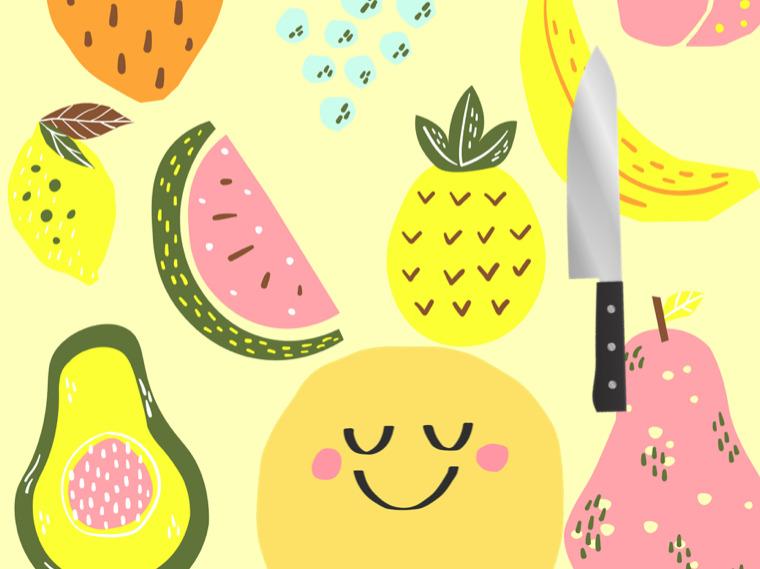
Over the years, I’ve experimented with a range of weird and wonderful stress-busting activities, including yoga, pilates, meditation classes, floatation tanks, massages, acupuncture, and sound healings (to name a few).
I’ll be the first to admit that cash-grabbing wellness gurus and advertisers have sucked me in.
In our capitalist culture, we’re sold this idea that in order to relax, we need to spend big dollars. But I now realise that the best relaxation experiences are cheap or free.
I’ve created rituals around cooking that help me stay calm, grounded, and focused throughout the day.
These days, cooking is my number one way to relax. My kitchen is my happy place, and it can be your happy place, too.
Perhaps this sounds a bit strange. But hear me out.
I haven’t always found cooking to be relaxing or particularly enjoyable.
Being half Italian, I used to get involved with the occasional food tradition, such as tomato sauce-making day. But it wasn’t like I grew up with the delicious smells of homecooked food wafting through the house.
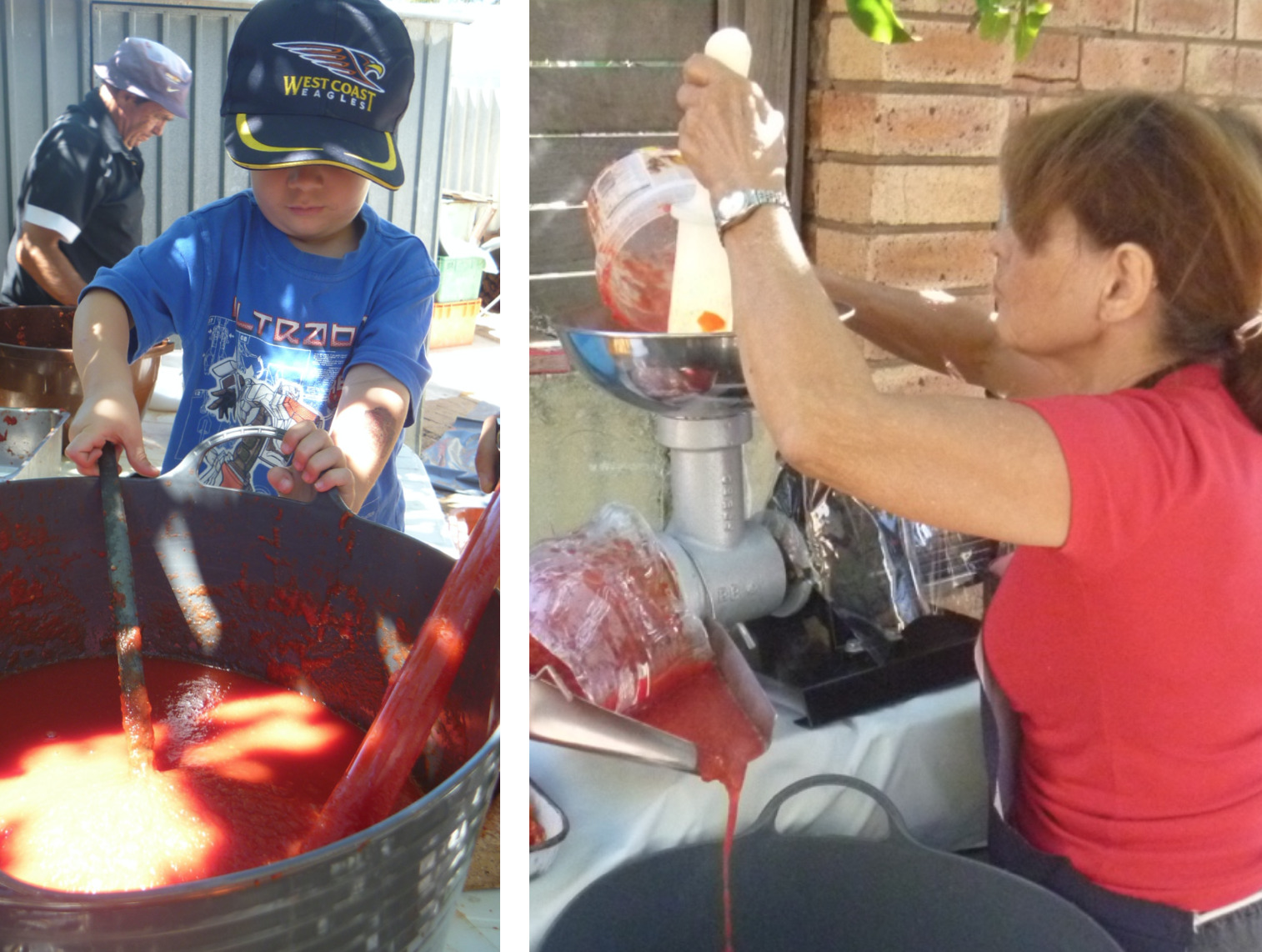
My teenage years and early twenties were filled with processed junk foods: a dizzying array of Hungry Jacks combos, greasy fish and chips, and takeaway meat lovers pizzas.
Cooking was a relaxation practice I stumbled upon much later in life.
Since upping my kitchen game and trading the expensive wellness activities for a sharp knife, solid chopping board, and fresh vegetables, my savings and confidence have grown.
To emerge from the kitchen in a calm and tranquil state, a few conditions have to be in place:
1. You cannot feel rushed
2. Your kitchen counter must be clean and clutter-free
3. You need a sharp knife to chop with
4. Your phone must be out of sight (like most things in life, it’s best not to multitask)
If these conditions are met, cooking can feel like a meditation or an empowering yoga class.
I’m not the only person who feels this way.
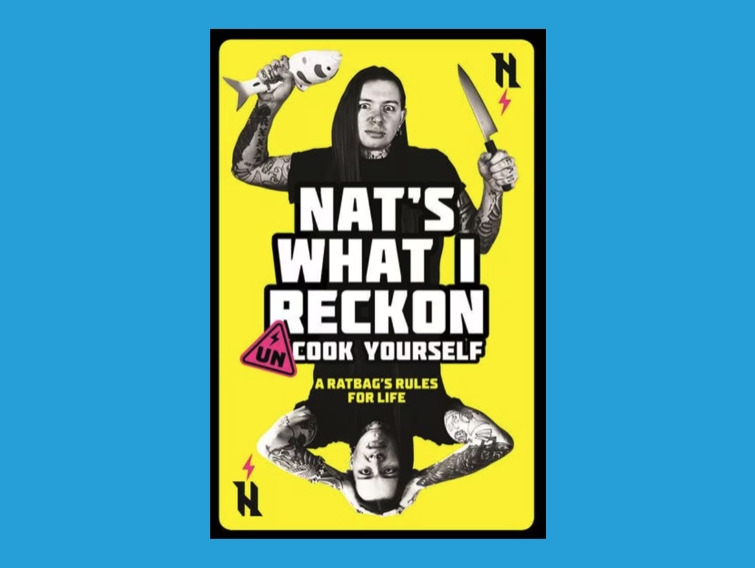
In the book ‘Uncook Yourself: A Ratbag’s Rules for Life’, Nat’s What I Reckon shares how he cooks his way through tough times. He writes:
“I reckon getting in the kitchen and un-cooking yourself from the tough moments in your head every now and then is a way better self-help routine than throwing five grand at some short-lived back pat from a cash grabbing blowhard at a self-help seminar just to tell you you’re not doing life right.”
One reason is you need to focus your mind.
When chopping with a sharp knife, you must pay attention to what you’re doing. If you get distracted, and I have (many times), you might pay the price with a cut to the finger.
Chopping is also a repetitive activity that delivers an immediate outcome. One minute, the bok choy is on the chopping board in full form; the next, it has been chopped and is ready for tonight’s stir-fry.
Cooking also requires you to slow down.
When you’re online, you tend to jump around in a frenzy. But when you’re cooking, you have to follow a recipe step-by-step. This requires focus. This focus helps to clear your mind.
Cooking also gives you a sense of control, power, and agency. As food journalist Michael Pollan says:
“Eating out breeds helplessness, dependence and ignorance, and eventually, it undermines any sense of responsibility.”
When you cook, you’re in control of the process (not some big corporate fast food company). Plus, compared to that commodified wellness experience, cooking is super cheap (all it costs is the price of a few ingredients).
It also produces a nourishing meal at the end. That meal will give you energy, help regulate your mood, and keep you calm and steady.
In the book ‘The Food Mood Connection’, Uma Naidoo argues that to decrease anxiety, you should pay attention to what you’re eating. She writes:
“A crucial part of battling anxiety is making sure your diet is full of foods that are calming and free of foods that put you on edge.”
Fast foods and highly processed foods. These foods (e.g., greasy hot chips and baked goods) are problematic because they lack fibre and the fragile micronutrients and phytochemicals needed for good brain health.
Naidoo recommends increasing your fibre intake by consuming more plants and whole foods, such as beans, brown rice, baked potatoes with the skin on, broccoli, pears, apples, and oats.
A few years ago, I delivered a talk called ‘Rediscovering the Ancient Art of Thrift’ at a local library. In my presentation, I shared the thrifty practice of avoiding eating out and cooking meals at home.
At this point in the presentation, an elderly gentleman put up his hand and said:
“But vegetables are expensive. Why not just get McDonald’s? It’s cheap, and there’s no cleaning up at the end.”
I immediately thought of a friend who, at the time, ate only McDonald’s (for breakfast, lunch, and dinner). His housemates had confided in me that his feet had developed a pungent odour.
Although my diet was far from perfect, I was concerned. If my friend kept going down this path, I could see him heading for serious trouble.
Fast forward a year: How was my friend doing?
He was not well.
He had put on a significant amount of weight and seemed depressed, rarely leaving his room except to get his next McDonald’s meal (back in those days, there was no Uber Eats).

I explained to this elderly gentleman in the library workshop:
“Maybe you’ll save a bit of time and money in the short term [buying the fast food], but eating processed food will cost you down the track. It will cost you in medical bills and poor health. Your quality of life will suffer.”
He nodded, but I could tell he wasn’t entirely convinced.
Until you’ve cut out the processed junk food, allowed a couple of weeks for your tastebuds to readjust, and developed the habit of home cooking, it’s easy to be sceptical. After all, we live in a world that values convenience. Opening an app, pressing a button, and having dinner delivered to your door in less than 20 minutes has some definite appeal.
But every time you order Uber Eats, you miss out on a valuable opportunity to practice slowing down and calming your mind. You also undermine your cooking skills.
If you haven’t developed the habit of cooking or cooking makes you feel anxious, there are a few simple things you can do to cultivate calm and confidence in the kitchen:
Cooking is a messy process. While I may start with a clean kitchen bench, it quickly becomes a mess. That’s how the process goes (I try to clean as I go).
It’s also okay to mess up a meal. Not every meal is going to be an absolute winner. In ‘The Four Hour Chef’, Tim Ferris encourages the reader to see meals that don’t work out as cheap cooking classes. Learn the lesson and move on.
When you think of cooking as one activity, it can feel overwhelming. I divide the cooking process into two stages:
1) Preparing the mise en place: chopping vegetables, taking out utensils, etc, and
2) Pulling it all together: cooking the dish.
In the morning, I take out all the ingredients for a dish so they are ready to go when I need to take a break from my work. I chop earlier in the day and cook the dish in the afternoon/early evening.

If I’m overwhelmed by the idea of chopping vegetables, I break it down to chopping just one vegetable at a time. I’ll say to myself:
“Just chop the capsicum. That’s all you need to do.”
It’s not fun chopping with a knife with a dull blade. A sharp knife combined with a lovely chopping board makes all the difference.
Learning basic chopping skills is a game changer. With the proper technique and a sharp knife, there’s no need to worry about cutting yourself. You can chop with ease.
I took a chopping skills course with the online cooking school Rouxbe, but you can find YouTube videos teaching you good chopping techniques.
You’re not running a restaurant. You don’t have to rush to get meals out to hungry customers. Take your time and enjoy the process of chopping each vegetable.
If approached with the right mindset, cooking can deliver a sense of calm and ground you in the present moment. You also get to experience the mental and physical benefits of a nourishing home-cooked meal. The bonus extra is saving a bit of money.
So, what are you waiting for? Pull out some ingredients and start cooking today.
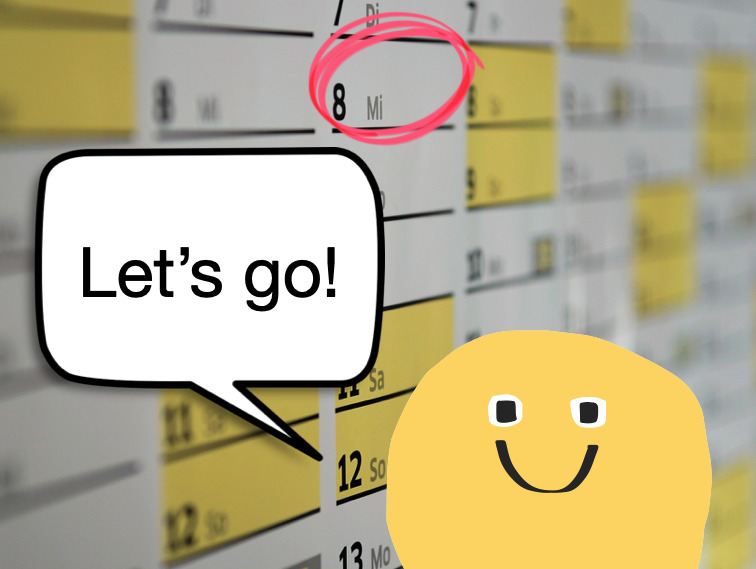
But how much time do you actually have?
It’s hard to get a sense just by thinking “My exam is in three weeks.” After all, three weeks sounds like plenty of time, right?
Don’t be fooled. This is your brain playing tricks on you.
No one ever has a full three weeks (504 hours) to prepare for an exam. Thrown into the mix is time for sleep, getting ready for school or work, working on assignments, socialising with friends and family, etc. Plus, you usually have more than one exam to study for.
But we can forget this. And when we do, we end up procrastinating with our work and it piles up for our future selves to deal with.
What’s missing is that your brain needs clear visual feedback. It needs to have a sense of the big picture (i.e., all your commitments laid out in front of it).
By using a year-at-a-glance calendar.
Earlier this year, I printed out a massive year-at-a-glance calendar (A0 size).
I scheduled all my upcoming presentations, holidays, important events (e.g., birthdays), deadlines, etc., onto the calendar and placed it in a prime position where I couldn’t miss it.
This calendar has made all the difference. It grounds me in reality, helps me feel more in control of my schedule, and gives me clear visual feedback. It also makes me think twice before I agree to take on a new project.
In the past, whenever I’ve said yes to a new opportunity, I haven’t always been grounded in reality. Too many times, I’ve been unintentionally cruel to future Jane.
Let me explain . . .
Back in 2016, I was on the home stretch with my PhD. The path forward was clear. After years of struggling with my PhD, the end was in sight. I was on track to hand in my thesis in a few months’ time.

But then something happened that threw me off course (well, erm, I threw myself off course).
I was asked by a company to run a series of workshops. Without even thinking, I said “Yes! I’d love to!”. It seemed like a great opportunity. One that was too good to pass up.
When I shared the news with my PhD supervisor, she seemed to think differently. Her face said it all: a mixture of concern and confusion.
“Why did you say yes to this? Do you need the money? What about your PhD? You’re so close to finishing”, she said.
The truth was I didn’t need the money. I said yes because without having my other commitments staring me in the face, I had all the time in the world. I was engaging in magical (delusional) thinking. I fantasised about having superhuman capabilities and being able to do it all.
I was wrong. There were only so many hours in the day, and something had to give.
To cut a long story short, pretty quickly the magical thinking wore off, and I regretted taking on the job. I had burdened my future self with a ridiculous amount of work and unnecessary stress.
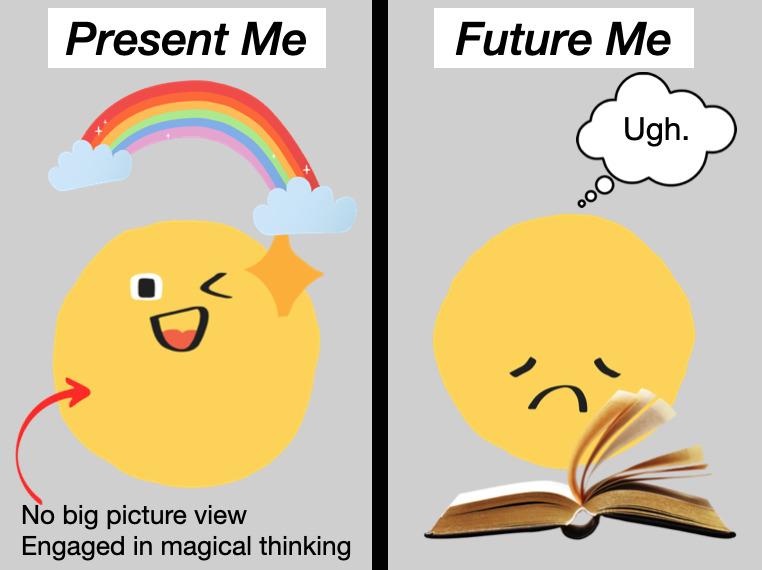
But worst of all, I had delayed handing in my thesis by several months. A few months might not sound like much in the big scheme of things. But when you’ve been plugging away at a PhD for seven years, every month becomes precious. I risked losing momentum.
If I could teleport back in time and place a year-at-a-glance calendar in my office space, I like to think that I would have prioritised my PhD over the shiny new opportunity.
I recently finished reading an excellent book called ‘The Extended Mind: The Power of Thinking Outside the Brain’ by Annie Murphy-Paul.
In this book, Annie explores nine principles for expanding our intelligence (note: these principles are not taught in schools). She argues that instead of pushing our brains to work harder and harder, we can use our bodies, relationships, and surrounding environment to boost our cognitive abilities.
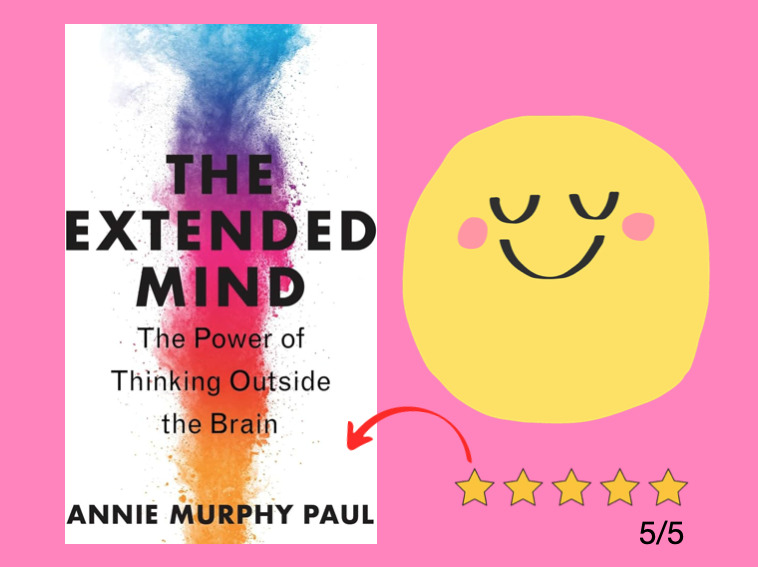
In the chapter called “Thinking with the Space of Ideas”, she writes:
“Whenever possible, we should offload information, externalize it, move it out of our heads and into the world. It relieves us of the burden of keeping a host of details “in the mind,” thereby freeing up mental resources for more demanding tasks like problem solving and idea generation.”
After reading this book, I understood why a year-at-a-glance calendar can be such a powerful tool. Seeing all your projects and commitments in one glance allows you to think smarter and more strategically.
These calendars also help to orient you in time. You can see how much time you have between now and doing the things you need to do.
Your projects and deadlines stare back at you every day. There’s no escaping them.
Seeing your life in this way also helps you to plan and pinpoint busy periods.
Here’s an example . . .
This month, I have more presentations scheduled than usual. This means I need to manage my energy levels, prioritise sleep, and eat healthily.
But a quick glance at my calendar tells me I have a few ‘free’ days before all these talks begin. I can use this time to cook a few meals to pop in the fridge and freezer to make life a little easier during this busier period.
One of the worst things I can do when I get busy is order takeaway food and sacrifice sleep to work. I refuse to do it as it always backfires. If I’m functioning at half capacity, my talks and work will suffer.
These calendars can also provide useful information to help you manage your energy levels, reduce ridiculous workloads, and avoid burnout.
Earlier this year, there was a week when I delivered more talks than usual. During this week, I found myself taking 15-minute power naps between talks to recharge before the next one. Even with all these power naps, by the end of the week, I felt tired. I drew a tired little emoji face on my calendar to represent this.
That tired emoji face is a constant reminder: you have mental and physical limits. Don’t overdo it.
It’s important to find a calendar that is both aesthetically pleasing and functional for you. This means you probably can’t just go to the shops and pick something off the shelf.
You could order a hard copy calendar online, but when the year is already well underway who wants to potentially wait weeks for their calendar to arrive in the mail?
You can purchase a digital download online and take it to your local print shop on a USB stick. Some templates display the month as a long list of days; whereas other calendars group the month into weeks, with each week on a separate line (see examples below).
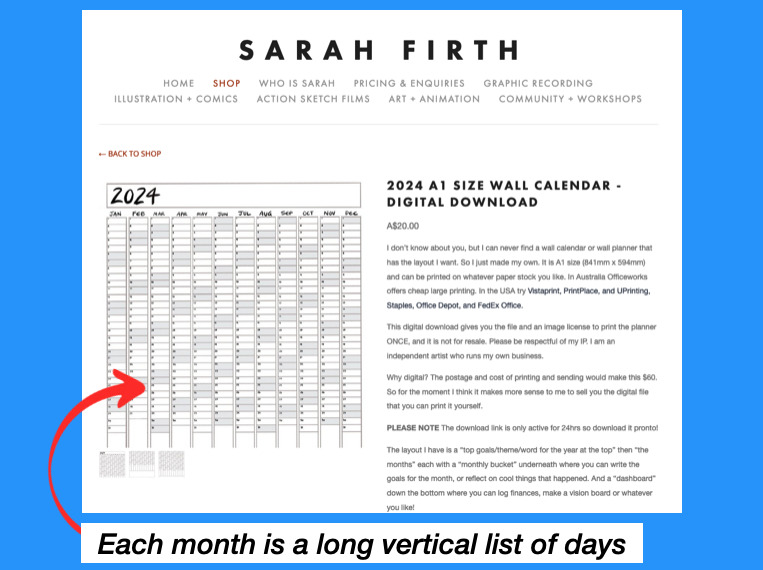
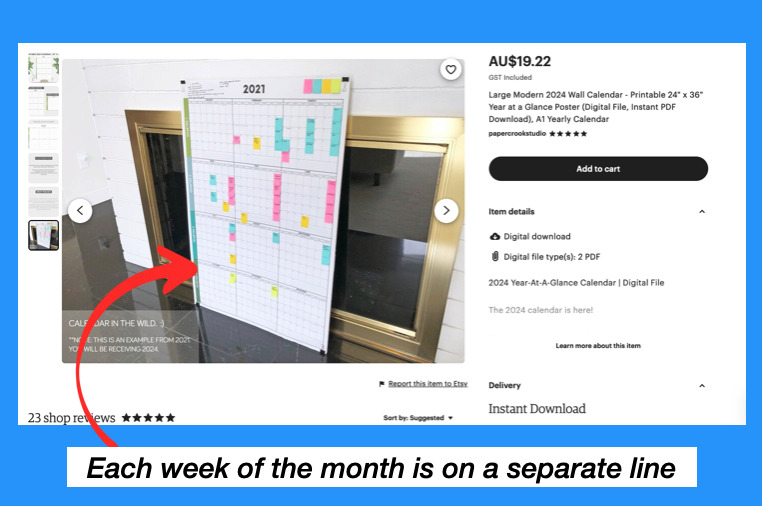
Alternatively, you could buy a monthly calendar, cut it up, and stick it together.
One of my friends suggested I try doing this. I gave it a shot, but my calendar looked like a failed arts and crafts project (with messy bits of tape plastered everywhere). Plus, the boxes were too small and cramped my style.
After some trial and error, I purchased a digital download from Etsy for $20AUD and printed it A0 size for $10AUD. All up, my calendar cost me $30AUD – money that was well spent.
The bottom line is you have to figure out what works for you and how much you’re willing to spend.
• Write on the calendar when all your exams, appointments, special events, and major projects will take place.
• If you don’t yet know the specific dates of each exam, note the week they begin and assume the worst-case scenario (your exams will be sooner rather than later).
• Consider laminating your calendar so you can use whiteboard markers on it.
• If laminating is too expensive, use sticky notes and washi tape instead.
• You can mount your calendar on core-flute material or foam board to give it a sturdier structure.
• Resist the urge to put every detail on your calendar. Focus on the big project deadlines, appointments, exams, etc. The details for what and when you work on each project can go into your weekly planner and/or on your to-do list.
• If you have the wall space, consider printing your calendar A0 size (841mm x 1189mm). You want plenty of space to write in each box.
In our noisy world where we are bombarded with endless opportunities, many of us would benefit from embracing analog tools like the year-at-a-glance calendar. These calendars help to ground us in reality and focus our minds on what matters.
If you have a lot going on in your world and find yourself saying “Yes!” to every shiny new opportunity that comes your way, do yourself a favour and create a year-at-a-glance calendar. Having your commitments stare you in the face every day is a simple but powerful way to live with greater focus and intentionality.
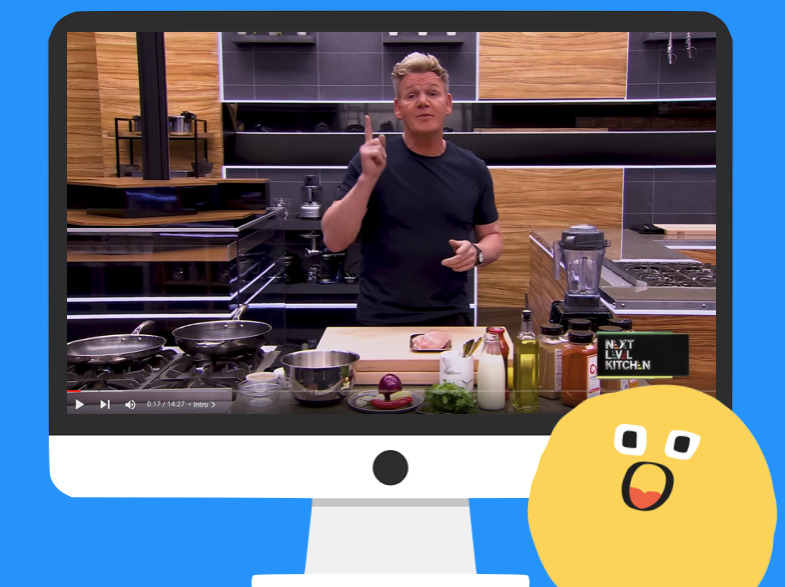
I recently watched a video of Gordan Ramsey cooking a ‘curry in a hurry’ (a butter chicken dish).
I was spellbound by the way Ramsey seamlessly cooked this dish. He was in flow and fully focused on the task of cooking the butter chicken.
What allowed him to whip up this dish plus a serving of rice in under 15 minutes?
Being organised helped a lot. Before he started cooking, chef Ramsey had all the ingredients and cooking utensils out on the bench, ready to go.
In chef’s speak, he had prepared the mise en place.
Mise en place is a culinary skill that can help us to study and work more efficiently. In this article, I explore this concept and how you can apply it to your life to help you stay calm, focused, and in control of your studies.
The mise en place is a French term that translates to “putting in place”. It means a place for everything and everything in its place.
Everything the chef needs is within arm’s reach. When it’s time to start cooking the dish, the chef knows where everything is. This allows the chef to focus on cooking the dish and stay calm and grounded under pressure.

In the book Kitchen Operations (a textbook for hospitality students and apprentice chefs), the authors write about the importance of being organised in the kitchen. They state:
“The ability to work in an organised manner is possibly the most important quality that anyone working in the preparation and service of food can demonstrate. You must develop this ability to complete the expected workload in the time available. Failure to be methodical in your approach will reduce efficiency and will lead to feelings of stress and frustration.”
The mise en place helps the chef avoid unnecessary stress and frustration.
Imagine the following scenario . . .
A chef starts cooking a pasta sauce.
The chef realises 10 minutes in that he is missing a key ingredient (tins of tomatoes).
The chef has to run to the shops to buy the tomatoes.
Chefs can’t afford to have that happen. They are time-pressured. They need to get meals out quickly to hungry customers.
The mise en place helps chefs avoid stressful situations like this. It can also help you decrease unnecessary stress, drama, and frustration associated with homework and study.
Before starting your work, set yourself up with everything you need to complete the task.
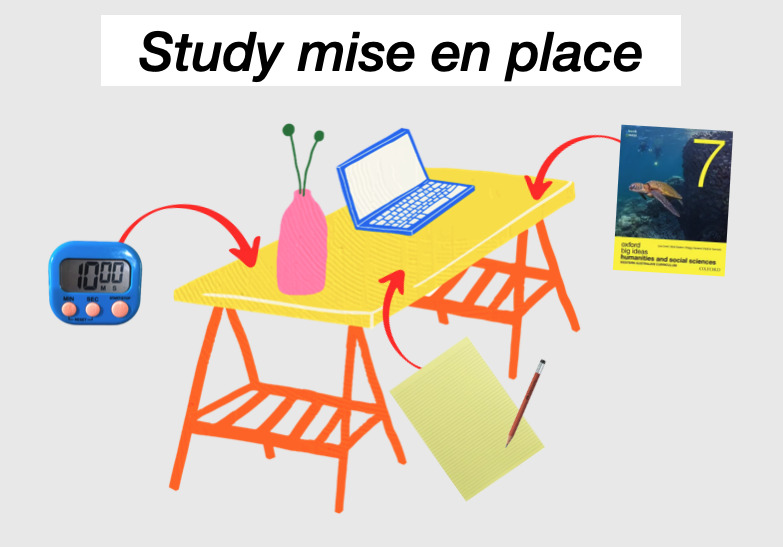
Think of this as the study desk mise en place. Ideally, you want to have a dedicated study space where everything is already set up. This saves you time, as you don’t have to set things up and pack things away after each study session.
But your desk isn’t the only space you can set up and prepare. In the world of study, you have other spaces you need to manage (e.g., a computer, school bag, pencil case, and locker). With each of these spaces, you need to ask:
“What items do I need in this space for my work to flow smoothly?”
It also helps to ask:
“What items don’t I want in this space?”
Just like a chef doesn’t want cockroaches, cats, and rats running around the kitchen and restaurant (or a visit from the local health inspector), there are things you want to keep out of your study space.
Remove anything that throws you off your game (i.e., makes you feel bad, distracted, overwhelmed, and upset) from your study space.
Here’s my list of things I want to keep out of my study space:
• My smartphone
• Long to-do lists
• Visual clutter
The point is to remove any friction points from your environment (anything that will slow you down and make it difficult to do your work).
The mental mise en place cannot be overlooked. This is the mental preparation part of the study process.
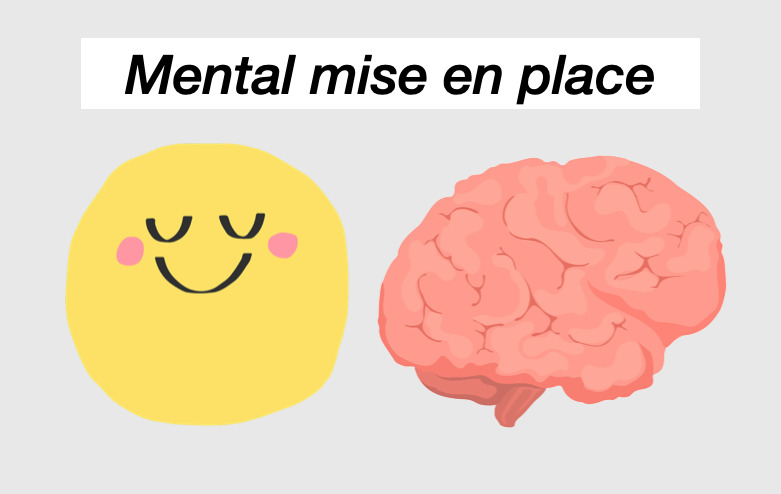
Ask yourself:
What must I do to mentally prepare myself for deep work/study?
Most of us can’t just scroll on our social media feed for an hour and launch straight into doing focused study. We need to get into the right headspace.
To be clear, I don’t mean you need to feel motivated, inspired, or in the right mood to study. Too often, we wait for motivation to strike, and it never comes. However, it certainly helps to be calm, focused, and grounded.
My mental preparation for the workday starts the evening before. Too many late nights have taught me that to wake up feeling calm and grounded, I need to go to bed at a reasonable hour.
When I wake up, I protect this mental calm by:
• Going for a walk or lifting heavy weights
• Doing a mini meditation (usually 3-5 minutes)
• Eating a healthy breakfast
• Avoiding checking my email and touching my computer first thing
• Journaling or mind mapping with pen and paper
I stay away from screens for as long as possible. This is essential for cultivating a calm mental state where I feel proactive and in control of my day.
I know I’m in trouble if I skip too many of the things on the list and start the day by checking my email. It becomes much more challenging to focus and get things done.
What is a pest of the mind?
It is anything that overstimulates the mind and leaves one feeling frenzied, scattered, and/or jangled.
Here’s the thing about learning information at a deep level: it requires you to slow down. You cannot rush it, like a 15-minute butter chicken dish.
But we engage with people, places, and things on a daily basis that speed up our thinking. In this overstimulated, wired mental state, learning feels like a hard slog.
Here’s a tip: start to notice the things that leave you feeling overstimulated. It can be incredibly liberating to cut back on these things or eliminate them completely from your life.
I am constantly tweaking my workspace and experimenting with different tools to help me click into a state of flow with my work. Here are some tools that I’m currently enjoying having as part of my study mise en place:
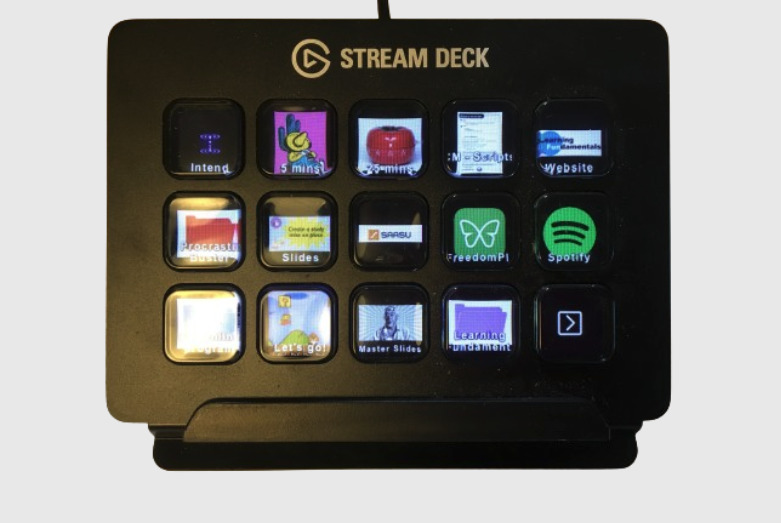
Technically, this is a gaming device that allows gamers who stream to switch scenes, adjust audio, etc at the tap of a button. I’m not a gamer, but I use my Stream deck to get started with various tasks and projects I feel resistance towards.
Instead of thinking, “Where is this file located? How do I get to it?” I tap a button on the Stream deck and it opens the file up. I tap another button, and it opens an application I frequently use.
No more frustrating clicking through numerous folders trying to find the document I need! The Stream deck helps to remove a big mental barrier and kick-start the work process with ease.
Stream decks aren’t cheap but if you can find one secondhand or on special like I did, they are well worth it.
Staying hydrated is super important. I fill a big jug with water every morning and place it on my desk with a glass. If water is within arm’s reach and I can see it, I find myself taking regular sips throughout the day.
I used nasty, cheap pens for years. Being a sucker for free stuff, I collected free pens at career expos and university open days. Without even realising it, these pens caused me a great deal of frustration and irritation.
These days, when it comes to pens, I don’t mess around with junk. There’s one pen I love using: the uniball signo (0.7). It’s a gel pen (you can find them at Officeworks). Writing with this pen is an absolute pleasure.
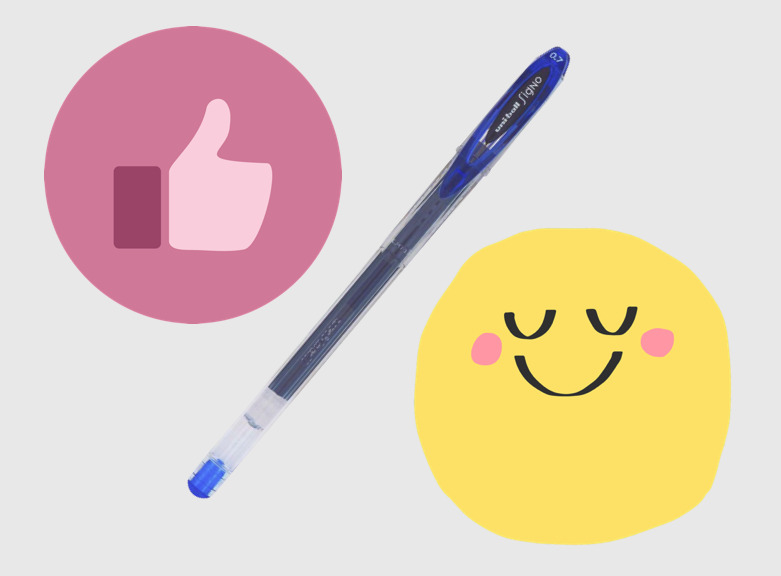
As Kevin Kelly says:
“Take note if you find yourself wondering “Where is my good knife?” or “Where is my good pen?” That means you have bad ones. Get rid of those.”
It’s super handy to have a notepad to jot down ideas and random thoughts as they arise. I recently discovered Rhodia notepads (a recommendation by The Pen Addict, Brad Dowdy). Writing on this paper feels like writing on butter!

Whenever I notice I’m procrastinating, I’ll set my timer for 10 minutes and say, “All I need to do is 10 minutes on this task. That’s all. Just 10 minutes”. I set the timer and away I go.
Other times, when my workspace looks like a mess, I’ll set a timer for 3 minutes and spend that time getting things back in order.
My planner tells me what to do and when to do it. For the last 6 weeks, I have been experimenting with Cal Newport’s time blocking method (planning my day in hourly blocks). It sounds torturous, but it’s strangely liberating.
When I open my planner, I can see what is happening for the week, but I don’t have a sense of the bigger picture. This is why I printed out a massive (A0 size) year-in-a-glance planner to schedule all my presentations, holiday breaks, special events, etc.
Having this calendar makes me feel more in control of my life. I can see when I have busy periods of presenting and when I need to balance those periods with extra rest time to sustain myself. I can also see events and deadlines relatively to where I am now.
These are just a few things I love having in my study/work mise en place. But we’re all different, so you need to figure out what works best for you.
When I recently asked a group of high school students what items they would need in their study mise en place, here’s what they came up with:
• Snacks
• Phone
• Pencil case
• Squishmallows
The first three suggestions didn’t surprise me, but the squishmallows sure did (the students were shocked that I’d never heard of a squishmallow before). I had to google them (they are soft toys).
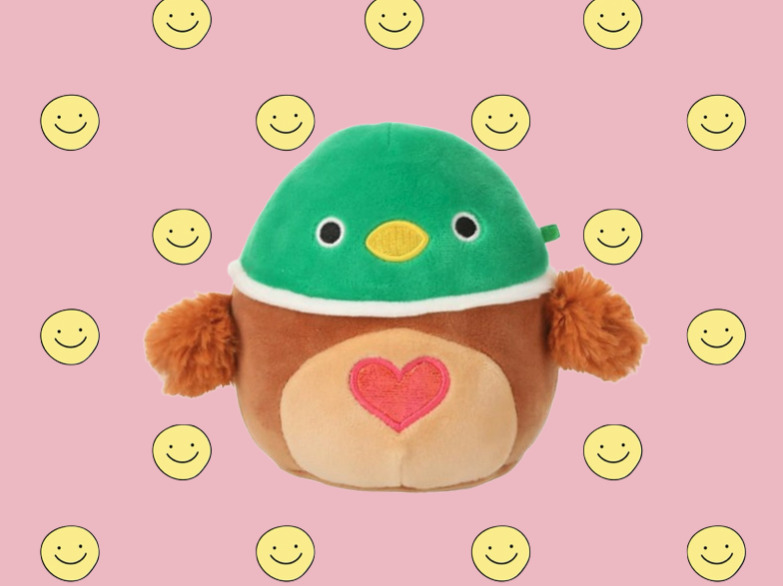
But I get it.
A squishmallow is fun.
It’s comforting.
It makes you feel good.
If something makes you feel good, go put it on your desk. Because if you feel good, it will be easier to think and learn.
The mise en place is a skill that can help all of us (not just chefs) focus on the task at hand. The point is you need to make your study mise en place work for you. You need to find the combination of ingredients that hits the spot.
Like a top chef has their favourite chopping knife, you’ll have your favourite pen. Spend some time experimenting with various tools and different work setups. By creating a more streamlined and organised study space, you’ll get that time back. Plus, you’ll find it’s much easier to get going and keep going with your work.
Dr Jane Genovese delivers interactive sessions on learning to learn, combating procrastination, exam preparation, how to focus in the age of distraction, habit formation and much, much more!
Get FREE study and life strategies by signing up to our newsletter:
© 2024 Learning Fundamentals